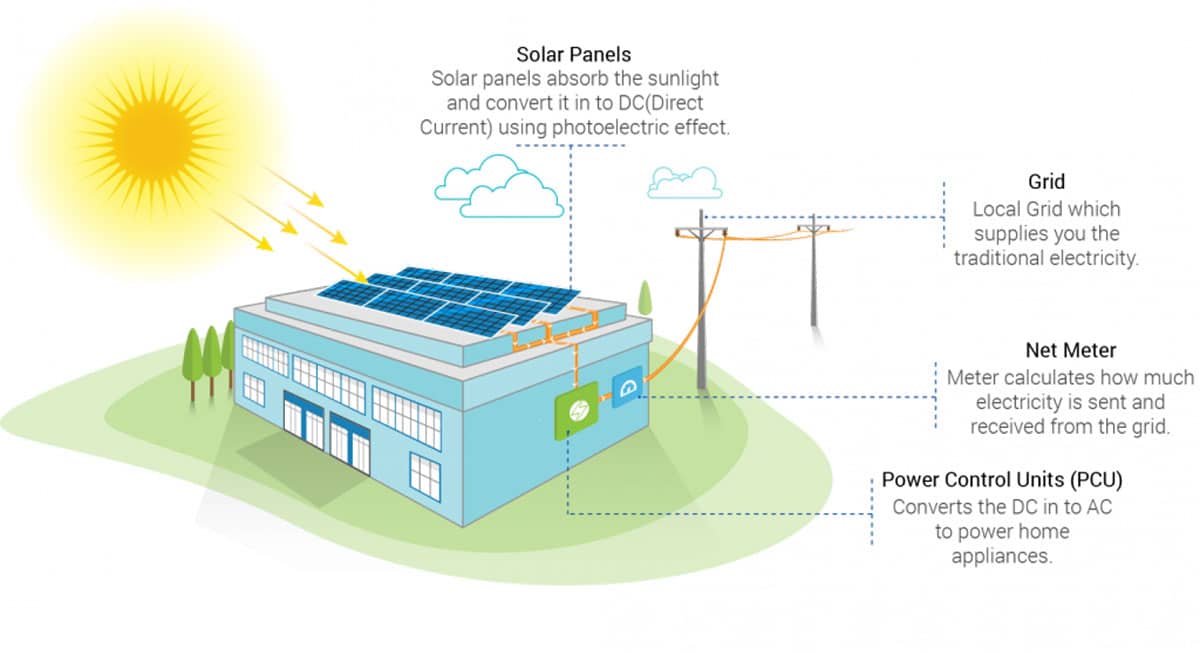Commercial Solar Installer
Do you want to know how much could you save on your energy bills with commercial solar installation? Click here to find out.
How commercial PV installation is beneficial for my business?
Most businesses use electricity between 9 am and 5 pm, hence when the electricity generation is consumed on-site when the sun is shining, it provides the most rapid payback. With government incentives and a decrease in solar equipment cost, getting a commercial solar system makes more sense now than ever. It is a sound investment both for long-term saving and quick payback.
How to proceed further towards commercial solar panels installation?
It is important to look for an experienced and accredited commercial solar installer. Commercial PV installation is quite complex compared to the residential solar system. It needs a detailed structural assessment of the roof area, the system’s connection to the mains grid, and a high-performance system tailored to your special requirements. There are many commercial solar companies in Sydney but it is good if you make sure they are accredited by CEC and have done commercial solar installation previously.
Are you worrying about whether you can afford the commercial Solar panel cost or not?
Well, if you can pay the electricity bills, you can afford the cost of the installation too. Moreover, it also adds worth to your property and makes you a community leader as Australia seeks to reduce its dependence on fossil fuels.
Solarmatic’s Commercial solar experts would help in selecting the Solar PV equipment as it is a very crucial decision to make. A little pro tip – Always go for components manufactured by companies with more than 5 years of experience in the solar industry and also make sure the warranty is supported locally. A good quality system lasts more than 25 years but there is a possibility that you need to avail assistance in some rare conditions so, a local commercial solar installer and local assistance is a plus point.
Click here to get a detailed energy assessment report of your commercial building.
As you know, a detailed energy assessment done by an accredited installer is a must. A thorough understanding of electricity charges helps you calculate the savings after solar installation. There are many factors involved in detailed energy assessment which your solar installer will help you understand such as hourly energy balance to make sure the electricity produced is getting utilized fully.
Some tips to help you understand better:
Commercial solar size break-ups:
- Less than 30 kW (Up to about 100 panels)
- 30-100 kW
- Over 100 kW
- Over 250kW
Less than 30 kW systems fall in the category of residential systems and use the same hardware and grid connection rules.
120 kWh of electricity is generated in a day on an average over a year by a 30-kW system and saves around $2000 per month (if 100% self-consumed).
Over 30 kW systems should consult specialist installers as these need special systems and permission from the local electricity network (DNSP).
Commercial Solar Rebates
What system sizes are eligible for STC’s?
Solar PV systems of up to 100 kilowatts in size are eligible for STC’s.
For systems over 100 kW, you aren’t entitled to get STC (Small-scale Technology Certificates) rebate but you still get LGC’s.
What is an LGC?
LGC stands for Large-scale Generation certificates. LGC’s are paid every year depending upon the amount of energy your system generates. To claim LGC’s, a company needs to register its business with Clean Energy Regulator to become an “accredited power station”. A special meter needs to be installed to track power generation properly and the report of the same is to be submitted every year to claim ‘rebate’. Metering must be up to the National Electricity market standards.
Important guidelines
- It is very important to take approval for connecting the Solar power system to Grid. Make sure to cover it with your commercial solar installer.
- Cost varies as per the size of the system installed, panel and inverter brands being used, whether micro-inverters are needed or not. System size ranges between 30 kW to 100 kW, cost around $1000 – $1300 per kW installed, or 20-30 kW costs around $700 kW.
- Check with your energy retailer the terms of the contract signed and understand them.
- Do an analysis of the savings on electricity charges after Solar Installation like which charges will be reduced and by how much.
- A good monitoring system is a must to see the reductions in a bill after solar installation. You get to see the gross consumption like the ‘before and after’ of solar installation for any particular hour. Solar Analytics offers a quality monitoring system.
- Make sure a detailed roof plan is shown before installation. A structural engineering certificate is of significant importance as physical inspection of the site by an engineer is a must.
- Sign your contracts wisely and it is advisable to show the contract to your lawyer once before signing it.
Know all about residential solar power in NSW here. From solar system size to government rebates and solar system, prices, we have covered it all.






